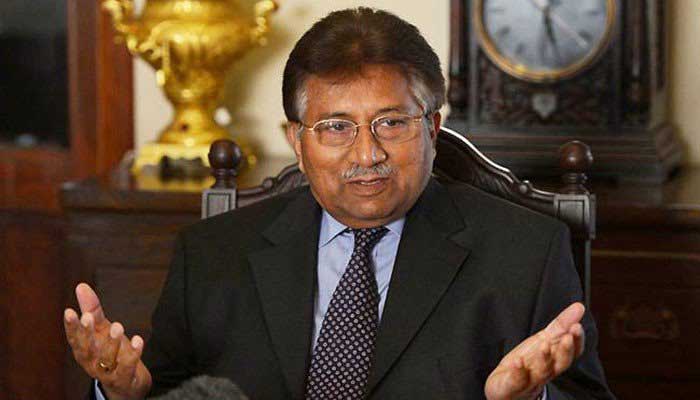Continued absence in treason case: What’s being done to bring Musharraf back
The court directed the Attorney General for Pakistan to appear before it in person and explain and submit a report by March 25 telling as to what measures had been taken so far by the federal government for bringing Musharraf back.
ISLAMABAD: The Supreme Court on Thursday directed the federal government to submit a report on the measures taken for repatriation of former president General (retd) Pervez Musharraf who’d been indicted in a treason case in 2014 by a Special Court.
A three-member bench of the apex court, headed by Chief Justice of Pakistan (CJP) Asif Saeed Khan Khosa, heard a petition filed by former president of Lahore High Court Bar Association, Rawalpindi bench, as well as a contempt petition filed by Advocate Sheikh Ahsen Uddin.
The court directed the Attorney General for Pakistan to appear before it in person and explain and submit a report by March 25 telling as to what measures had been taken so far by the federal government for bringing Musharraf back.
The court also sought a report from the Special Court registrar explaining reasons for delaying proceedings in the high treason case. Petitioner Sheikh Ahsen Uddin told the court that under Article 5 of the Constitution, loyalty to the state as well as to the Constitution was the basic duty of every citizen of Pakistan. He said although a special court had been constituted for trying Musharraf for high treason yet the new government halted its proceedings.
Similarly, he requested the court to inquire from the government as to what steps it had taken so far for bringing Musharraf back, as the special court had repeatedly issued his production orders but he was yet to be brought back.
Taufeeq Asif also pleaded that the proceedings of the Special Court had been halted and there had been no progress so far on Musharraf’s repatriation. Chief Justice Asif Saeed Khan observed that it was said the court had allowed Musharraf to go abroad but the fact was that the government and not the court allowed him to go abroad.
Justice Khosa said the court had left it to the government but did not mention in its order that Musharraf be sent abroad. “If the accused does not come back then his statement can be recorded through a video link. If he does not record his statement via video link, then it will be understood that he has denied the charges,” said the chief justice.
“The Special Court can write 'denied' in front of all his statements,” the CJP remarked and asked if the court became helpless if a suspect refused to appear before it. The chief justice said everyone was equal before the law and issued notices to the federal government and all respondents in the instant matter.
Later, the court adjourned the herring. It is pertinent to mention that the Special Court had indicted Musharraf in high treason case on March 30, 2014 for imposing emergency rule on November 3, 2007
The Pakistan Muslim League-Nawaz (PML-N) government had filed a treason case against him. A three-member special court on May 11, 2016 declared Musharraf an absconder for failing to appear before the court despite issuing multiple summons. Later, the court declared him a proclaimed offender and ordered seizure of his property.
-
 Breezy Johnson Engaged At Olympics After Emotional Finish Line Proposal
Breezy Johnson Engaged At Olympics After Emotional Finish Line Proposal -
 King Charles Wants Andrew To 'draw A Line' Under Epstein Issue
King Charles Wants Andrew To 'draw A Line' Under Epstein Issue -
 John Wick Game Confirmed With Keanu Reeves And Lionsgate Collaboration
John Wick Game Confirmed With Keanu Reeves And Lionsgate Collaboration -
 Gigi Hadid Feels 'humiliated' After Zayn Malik's 'pathetic' Comment: Source
Gigi Hadid Feels 'humiliated' After Zayn Malik's 'pathetic' Comment: Source -
 Olympics Men Hockey Game: McDavid, Crosby Power Canada Past Czechia
Olympics Men Hockey Game: McDavid, Crosby Power Canada Past Czechia -
 Sony PlayStation State Of Play Reveals 'Castlevania' And 'Metal Gear' Return
Sony PlayStation State Of Play Reveals 'Castlevania' And 'Metal Gear' Return -
 Ontario Tuition Freeze Ends, Allowing Colleges And Universities To Raise Fees
Ontario Tuition Freeze Ends, Allowing Colleges And Universities To Raise Fees -
 King Charles Should Apologise To All Rape Victims, Says New Poll
King Charles Should Apologise To All Rape Victims, Says New Poll -
 Cardi B Shares Emotional Message Amid Stefon Diggs Split Rumors
Cardi B Shares Emotional Message Amid Stefon Diggs Split Rumors -
 James Van Der Beek’s 'heartbroken' Ex Wife Breaks Silence Of His Death
James Van Der Beek’s 'heartbroken' Ex Wife Breaks Silence Of His Death -
 Sarah Ferguson, Shamed Andrew Spotted In ‘family Costume Drama’
Sarah Ferguson, Shamed Andrew Spotted In ‘family Costume Drama’ -
 Kylie Kelce Reveals Why She Barely Planned Her Wedding Day?
Kylie Kelce Reveals Why She Barely Planned Her Wedding Day? -
 Why Shamed Andrew Called His Victims ‘Mrs Windsor’
Why Shamed Andrew Called His Victims ‘Mrs Windsor’ -
 Kate Hudson Explains Why Acting Isn't Discussed At Home
Kate Hudson Explains Why Acting Isn't Discussed At Home -
 Prince William, Kate Middleton Epstein Statement Was AI Generated, Says Expert
Prince William, Kate Middleton Epstein Statement Was AI Generated, Says Expert -
 Sarah Ferguson On Her Way To Hurt 'only Two People Who Care About Her'
Sarah Ferguson On Her Way To Hurt 'only Two People Who Care About Her'




